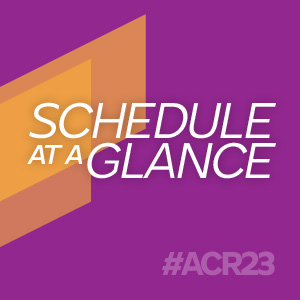Poster Session B
Epidemiology, health policy and outcomes
Session: (0965–0992) Epidemiology & Public Health Poster II
0978: Identifying Important Clinical Features for Predicting Remission in Patients with Rheumatoid Arthritis Treated with Biologics Using Machine Learning Model
Monday, November 13, 2023
9:00 AM - 11:00 AM PT
Location: Poster Hall
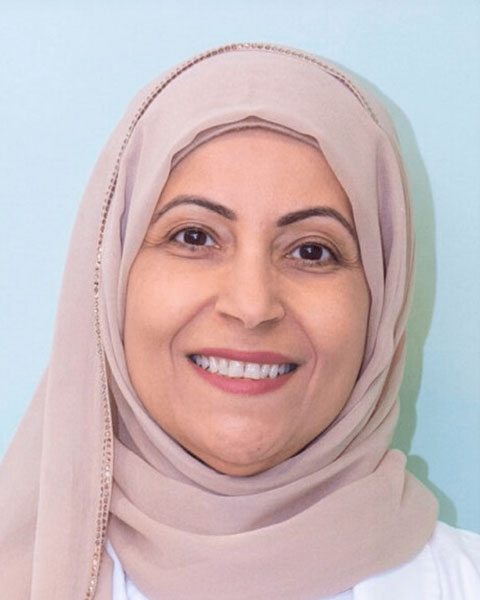
Adeeba Alherz, MD, FRCPC, FRCP (she/her/hers)
Al-Amiri Hospital
Kuwait, KuwaitDisclosure information not submitted.
Abstract Poster Presenter(s)
Ahmad Alsaber1, Adeeba AlHerz2, Balqees Alawadhi3, Parul Setiya4, KHULOUD MOHAMMED5, Adel Al-Awadhi6, Waleed Al-Kandari7, Eman Hasan8, Khaled Mokaddem9, Aqeel Ghanem10, Youssef Bartella11, Mohammed Hussain8, Naser Alhadhood12, Yaser Ali13, Ebrahim Nahar13, Ali Aldei8, Ahmad Alenizi14, Sawsan Hayat15, Fatemah Abutiban16 and Fatemah Abutiban11, 1American University of Kuwait, Kuwait City, Kuwait, 2Al-Amiri Hospital, Al Asimah Governate, Kuwait, 3The Public Authority for Applied Education and Training, Kuwait City, Kuwait, 4GBPUAT, Department of Agrometerology, Pantnagar, India, 5Farwaniya Hospital, Kuwait, Kuwait, 6Kuwait University, Kuwait City, Kuwait, 7Farwaniya Hospital, Division of Rheumatology, Ministry of Health, Kuwait, Kuwait, 8Amiri Hospital, Division of Rheumatology, Kuwait City, Kuwait, 9Al-Amiri Hospital, Rheumatoid, Al Kuwayt, Kuwait City, Kuwait, 10Mubarak Al-Kabeer Hospital, Division of Rheumatology, Kuwait City, Kuwait, 11Farwaniya Hospital, Department of Rheumatology, Kuwait, Kuwait, 12Farwaniya Hospital, Kuwait City, Kuwait, 13Mubarak Al-Kabeer Hospital, Department of Rheumatology, Jabriya, Kuwait, 14Jahra Hospital, Al Jahra, NY, Kuwait, 15Ministry of Health - Kuwait, Jabriya, Kuwait, 16Jahra Hospital, Department of Medicine, Al Jahra, Kuwait
Background/Purpose: Biologic disease-modifying antirheumatic drugs (bDMARDs) offer promising results for rheumatoid arthritis (RA) patients in general, but a substantial percentage of patients do not respond to them. It is important to predict the response before the treatment so that unnecessary adversities for the patients and costs for the healthcare system can be avoided. We developed a model to predict remissions in patients treated with bDMARDs and to identify important clinical features associated with remission using several machine learning (ML) models system that works with readily-available demographic and clinical factors for prediction of response to DAS-28.
Methods: We gathered the follow-up data of 1,000 patients treated with bDMARDs (etanercept, adalimumab, golimumab, infliximab, abatacept, and tocilizumab) from KRRD. Patients were recruited from public hospitals in Kuwait between February 2013 to September 2022. Remission (DAS-28 less than 2.6) was predicted at 1-year follow-up using baseline clinical data obtained at the time of enrollment. Machine learning methods system (including: lasso, ridge, support vector machine, random forest, XGBoost, and Shapley additive explanation (SHAP)) were used for the predictions.
Results: The ranges for accuracy and area under the receiver operating characteristic of the newly developed machine learning model for predicting remission were 52.8–72.9% and 0.463–0.719, respectively. The Shapley plot in XAI showed that the impacts of the variables on predicting remission differed for each bDMARD. The most important features were age for adalimumab, rheumatoid factor for etanercept, erythrocyte sedimentation rate for infliximab and golimumab, disease duration for abatacept, and C-reactive protein for tocilizumab, with mean SHAP values of − 0.250, − 0.234, − 0.514, − 0.227, − 0.804, and 0.135, respectively.
Conclusion: Our proposed machine learning model system successfully identified clinical features that were predictive of remission in each of the bDMARDs. This approach may be useful for improving treatment outcomes by identifying clinical information related to remissions in patients with rheumatoid arthritis.
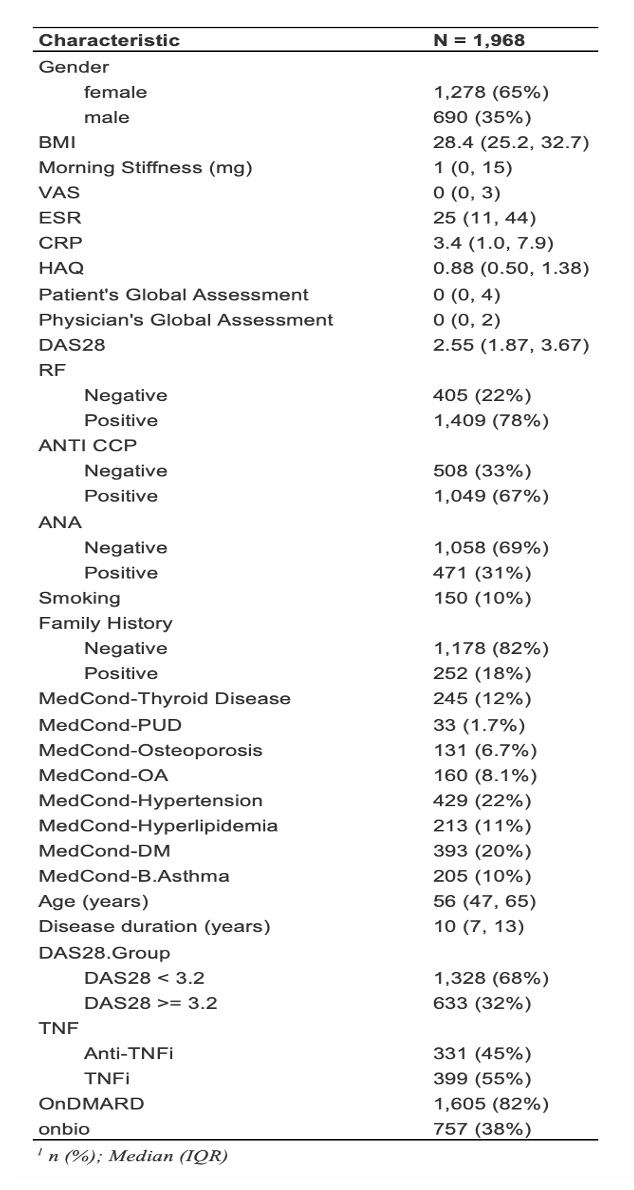
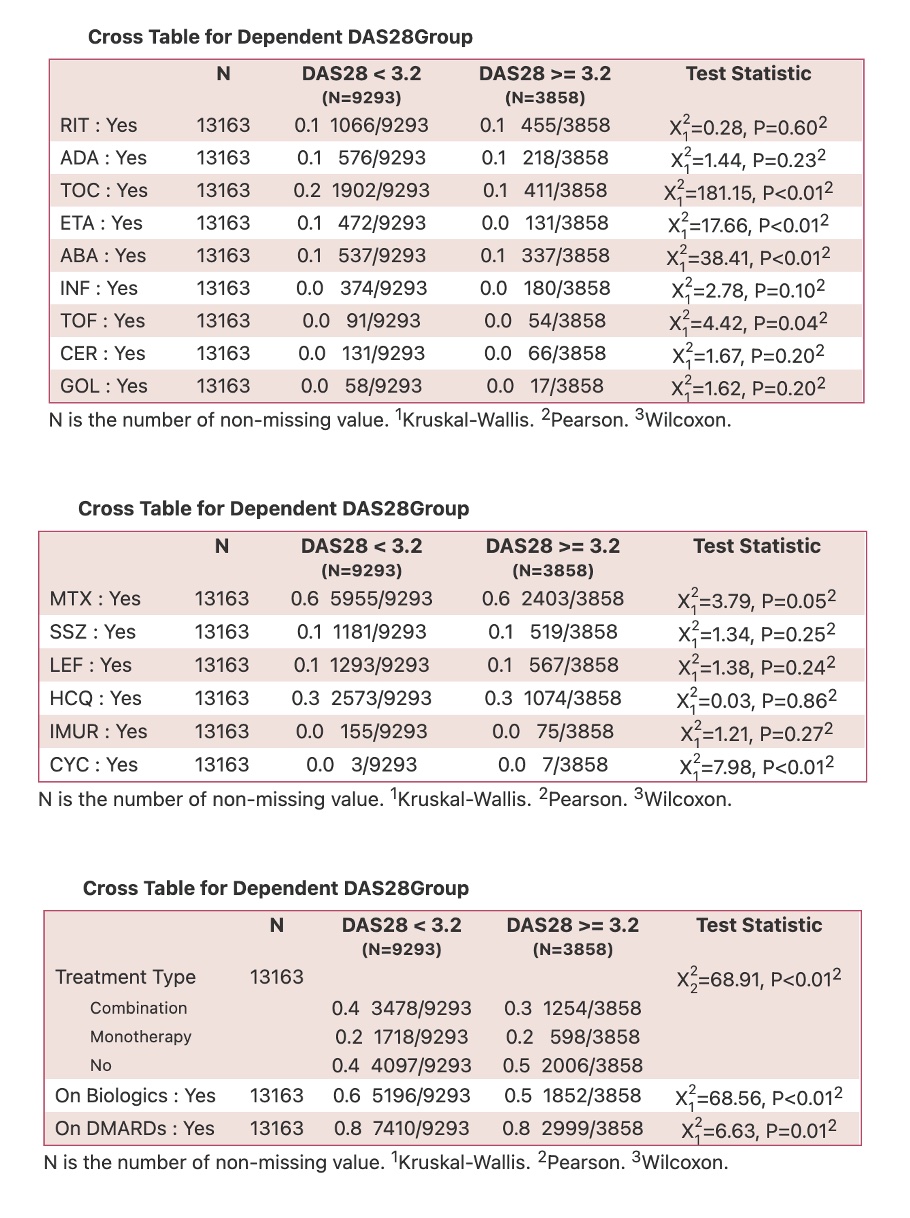
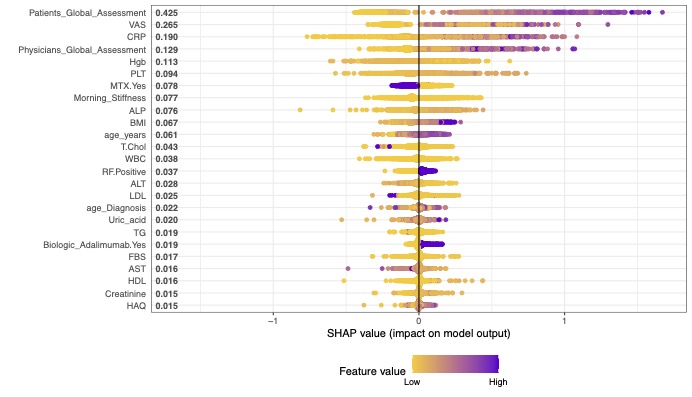
A. Alsaber: None; A. AlHerz: None; B. Alawadhi: None; P. Setiya: None; K. MOHAMMED: None; A. Al-Awadhi: None; W. Al-Kandari: None; E. Hasan: None; K. Mokaddem: None; A. Ghanem: None; Y. Bartella: None; M. Hussain: None; N. Alhadhood: None; Y. Ali: None; E. Nahar: None; A. Aldei: None; A. Alenizi: None; S. Hayat: None; F. Abutiban: None; F. Abutiban: None.
Background/Purpose: Biologic disease-modifying antirheumatic drugs (bDMARDs) offer promising results for rheumatoid arthritis (RA) patients in general, but a substantial percentage of patients do not respond to them. It is important to predict the response before the treatment so that unnecessary adversities for the patients and costs for the healthcare system can be avoided. We developed a model to predict remissions in patients treated with bDMARDs and to identify important clinical features associated with remission using several machine learning (ML) models system that works with readily-available demographic and clinical factors for prediction of response to DAS-28.
Methods: We gathered the follow-up data of 1,000 patients treated with bDMARDs (etanercept, adalimumab, golimumab, infliximab, abatacept, and tocilizumab) from KRRD. Patients were recruited from public hospitals in Kuwait between February 2013 to September 2022. Remission (DAS-28 less than 2.6) was predicted at 1-year follow-up using baseline clinical data obtained at the time of enrollment. Machine learning methods system (including: lasso, ridge, support vector machine, random forest, XGBoost, and Shapley additive explanation (SHAP)) were used for the predictions.
Results: The ranges for accuracy and area under the receiver operating characteristic of the newly developed machine learning model for predicting remission were 52.8–72.9% and 0.463–0.719, respectively. The Shapley plot in XAI showed that the impacts of the variables on predicting remission differed for each bDMARD. The most important features were age for adalimumab, rheumatoid factor for etanercept, erythrocyte sedimentation rate for infliximab and golimumab, disease duration for abatacept, and C-reactive protein for tocilizumab, with mean SHAP values of − 0.250, − 0.234, − 0.514, − 0.227, − 0.804, and 0.135, respectively.
Conclusion: Our proposed machine learning model system successfully identified clinical features that were predictive of remission in each of the bDMARDs. This approach may be useful for improving treatment outcomes by identifying clinical information related to remissions in patients with rheumatoid arthritis.

Table 1. KRRD RA Patients Demographics

Table 2. Comparison between DAS-28 levels with other rheumatoid factors

Figure 1. The SHAP results that emphasize the most clinical characteristics of RA patients using rituximab (RIT)
A. Alsaber: None; A. AlHerz: None; B. Alawadhi: None; P. Setiya: None; K. MOHAMMED: None; A. Al-Awadhi: None; W. Al-Kandari: None; E. Hasan: None; K. Mokaddem: None; A. Ghanem: None; Y. Bartella: None; M. Hussain: None; N. Alhadhood: None; Y. Ali: None; E. Nahar: None; A. Aldei: None; A. Alenizi: None; S. Hayat: None; F. Abutiban: None; F. Abutiban: None.

